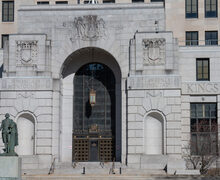Alpha Chi Rho National Council closes SU chapter
Corey Henry | Daily Orange File Photo
The fraternity's national council announced that the decision to close the Phi Epsilon Chapter at Syracuse University went into effect on June 28.
Get the latest Syracuse news delivered right to your inbox.
Subscribe to our newsletter here.
The Alpha Chi Rho National Council announced the dissolution of its Phi Epsilon Chapter at Syracuse University on Friday. The decision went into effect June 28, the council wrote.
SU has previously suspended Alpha Chi Rho multiple times, including in Nov. 2019 when a university investigation concluded that members and guests of the fraternity were involved in shouting a racial slur at a Black woman.
Alpha Chi Rho contested the suspension in court, which led to a state Supreme Court judge annulling the ruling in March 2021. The judge stated there was “no rational basis” to the university’s decision.
SU suspended the fraternity again in Feb. 2021, citing student conduct violations.
“Alpha Chi Rho is no longer recognized by the university nor is it permitted to operate,” Sarah Scalese, the senior associate vice president for communications, said in a statement at the time.
SU continues to list Alpha Chi Rho as an “unrecognized fraternity.”
The council wrote that it is “committed” to returning to SU at some time when they are able to partner with the university’s administration and members of greek life.
The national council did not specify in the press release why the decision to dissolve the Syracuse chapter was made at this time, nor the reasoning behind its decision.
This post will be updated with additional reporting.
Published on July 18, 2022 at 5:41 pm
Contact Grace: gdkatz@syr.edu






